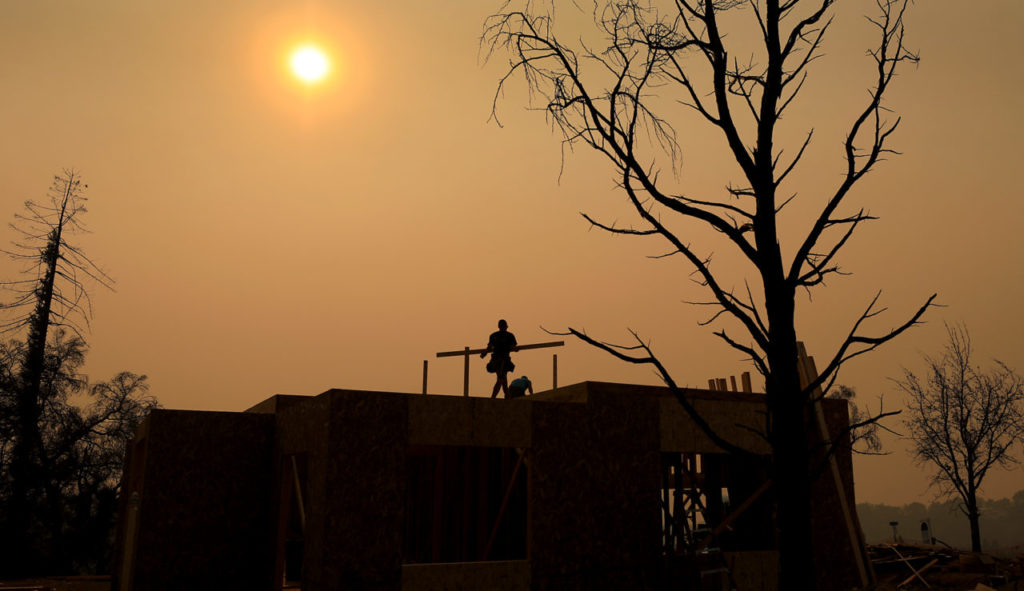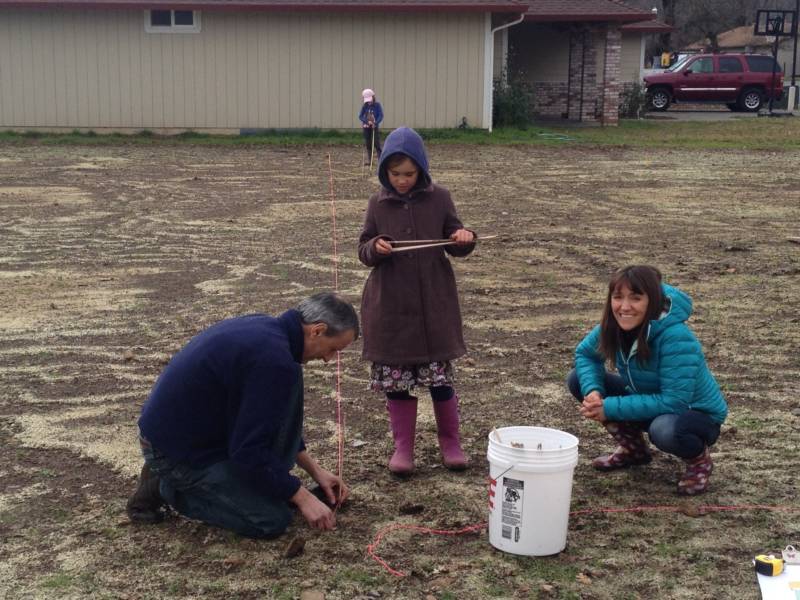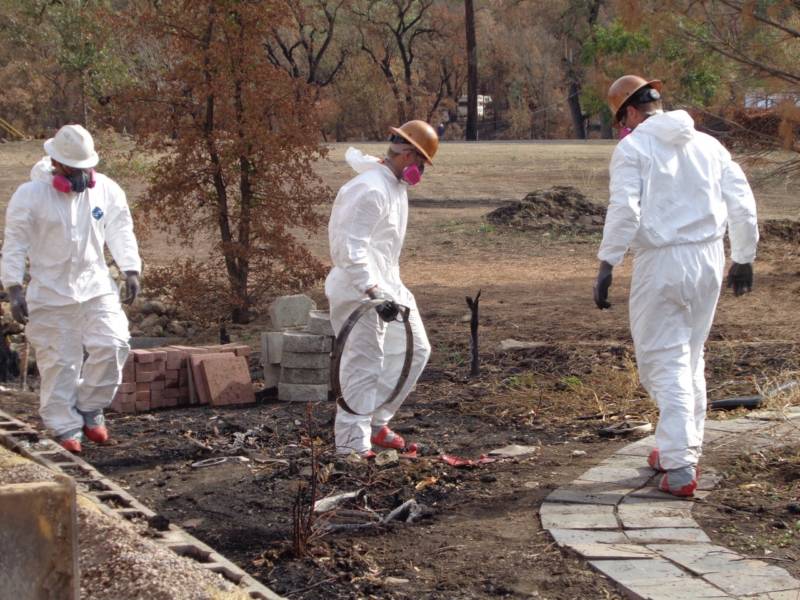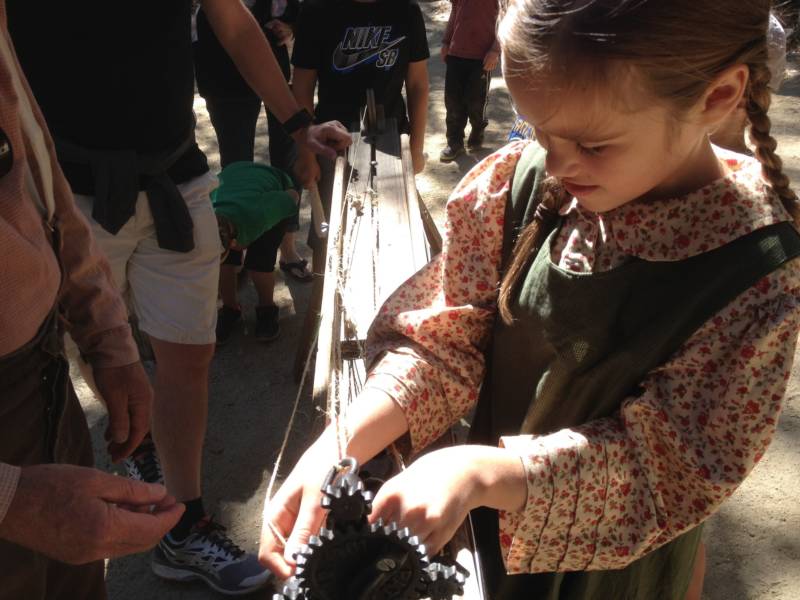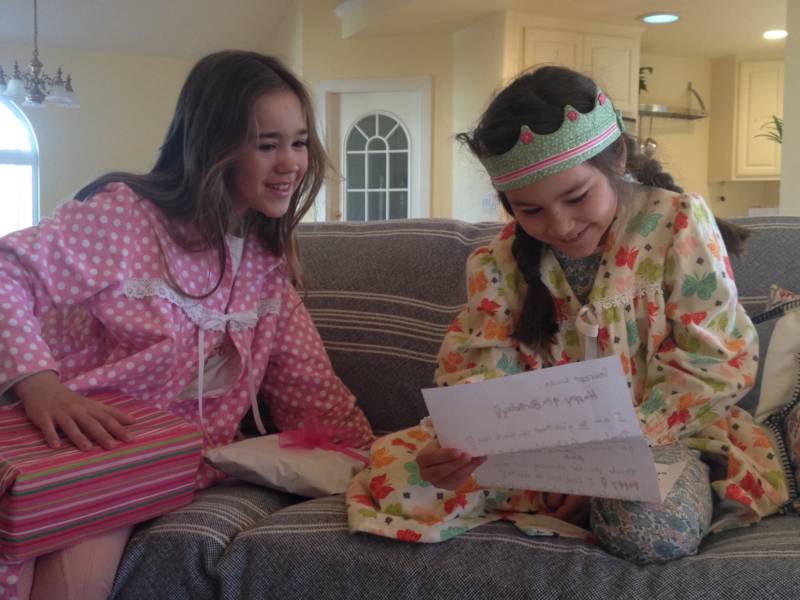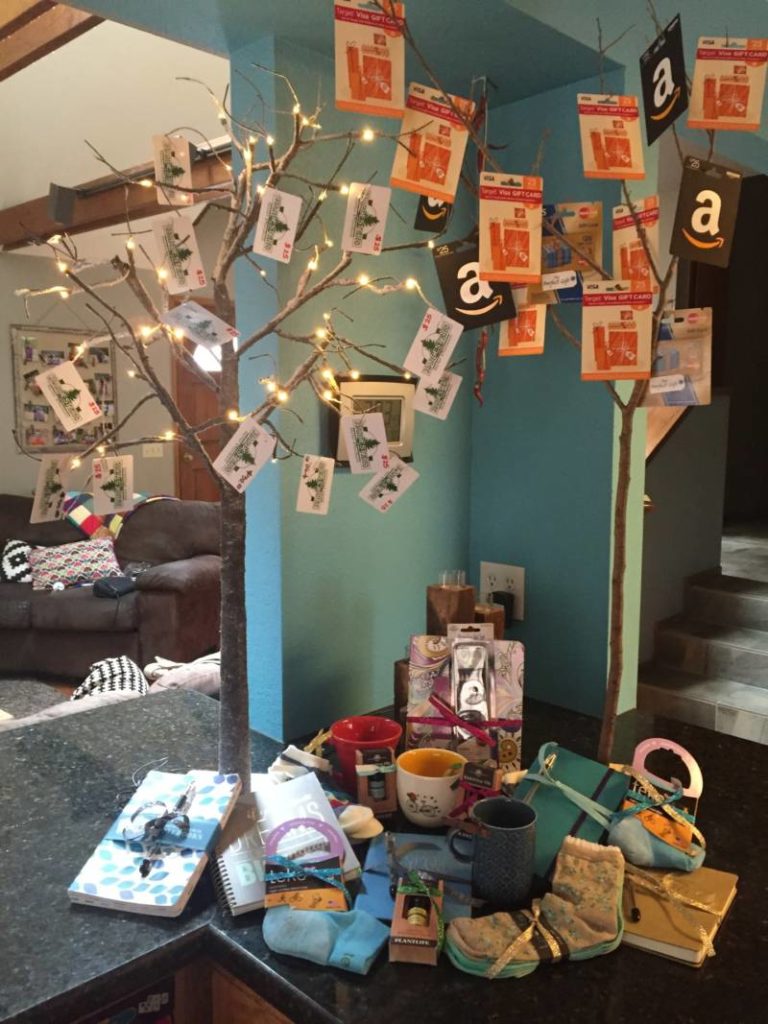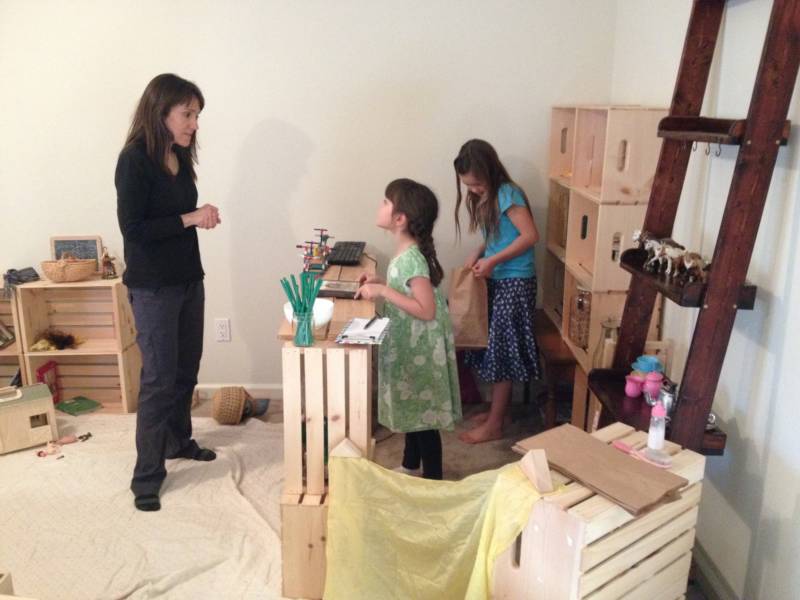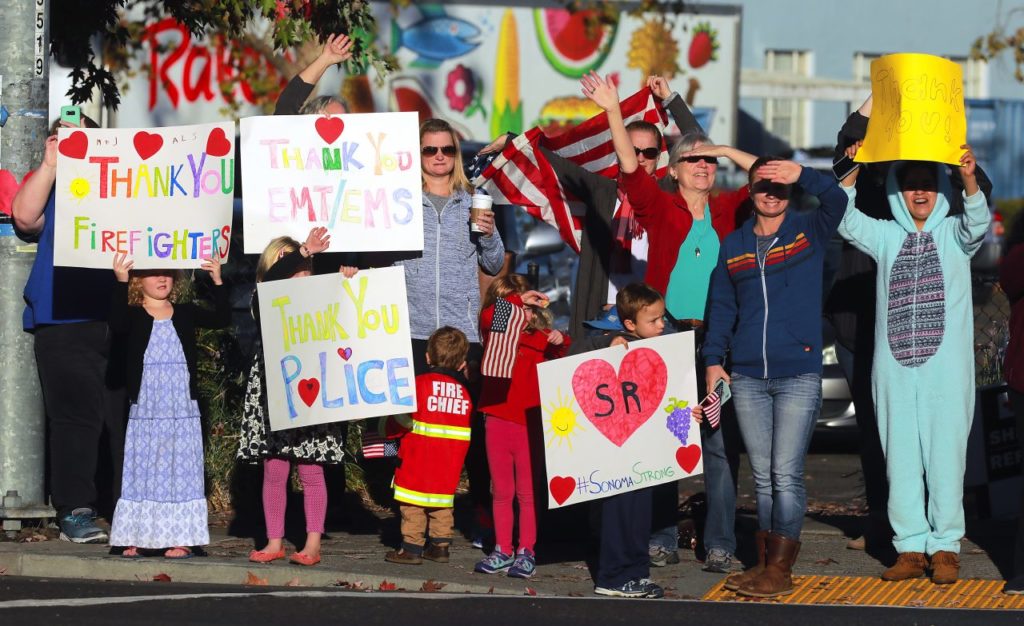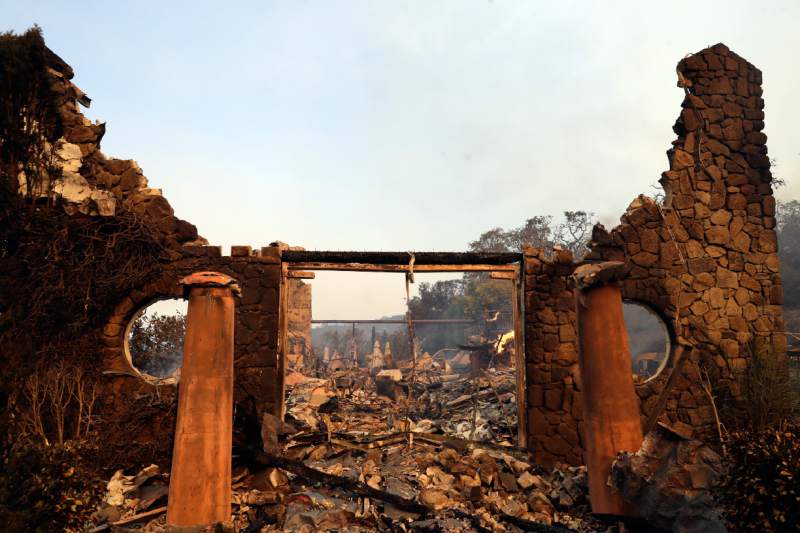Carolynn Spezza and her family lost their home to the 2015 Valley Fire. This article was originally published by KQED in October 2017.
One of the things that surprised me in the wake of losing our home was the power of kindness to buffer threads of stress and sadness before they could take root and overwhelm our family. Logistically, the support of gift cards, coffee cups, blankets or a pair of scissors was invaluable.
However, it was kindness from those near and far, friends and strangers, that created beauty in the midst of ugliness and healing in the midst of despair.
Below are 15 tips we offer to those longing to support friends or loved ones navigating the treacherous path of rebuilding a life after home loss. Among these ideas, I hope you find a way of reaching out that feels meaningful.
With the needs so vast, rest assured that there is a way you can offer support that falls within your resources and skill set, even if you are pushed a tiny bit out of your comfort zone.
1. Support the debris removal process
Offer support in the coming months on the days the debris removal crew comes to clear the lot. This valuable support can be given by being present at the lot, hosting dinner at the end of the day or simply knowing the dates of debris removal and picking up the phone for a check‐in call.
Focus on quietly helping a friend feel seen and giving them an opportunity to verbalize a range of intense or confusing emotions. If relevant, prior to debris removal, offer to help sift through ashes for remnants of cherished belongings. If you are welcomed into this process, please note the following:
The sight of a lost home may be a sacred burial ground of a lost life. Focus on being a respectful guest with slow moments and quiet energy.
Allow your friend to remain the leader at all times. Ask where you should be and what you should pick through. Refrain from going into treasure hunt mode, even if the opportunity is compelling.
Wear a mask, gloves and either a government‐provided disposable protective suit or shoes and clothing you can discard afterwards in the trash. Invisible dust composed of remnants of insulation, metal and other toxins may otherwise be absorbed through your skin or breathed into your lungs. Ensure your friends wear protective clothing/gear as well. If they are weary, be vulnerable and voice that you care about their health. There is no time like the present to help them feel cherished.
During debris removal there may be little need to talk or fathom the experience of losing a home. Your value is being a rock of quiet, steady support.
2. Just listen
Sit in the discomfort. Do not offer a bright side. Finding a silver lining is their work, not yours.
Use your words to validate, not minimize. Refrain from saying, “It was just stuff.” For some people, they just lost their way of life. Sadly, they are probably also embarking on an insurance nightmare, financial ruin or both.
If finding the right words is a struggle, consider asking:
“What feels overwhelming today?”
“What is on your mind today?”
“What do you miss or feel angry about today?”
“What are some tasks you need to accomplish today?”
3. Show up to help clean
When a friend is moving in or out of a new living arrangement, offer to help clean — and offer to bring cleaning supplies. Insurance will likely not pay for this. Cleaning a house one must move in or out of in the midst of mourning a destroyed home can feel like just one more bitter piece of a new life a person is suddenly trapped within.
Not being alone in this endeavor can soften the sting and free up time to tackle other parts of an endless to-do list.
4. Ask how you can help even if you live far away
Support from those living afar is invaluable after a disaster because the natural, local network has been compromised. Nearby friends and family who would normally fill the role of helper may be walking around in a daze or scrambling to rebuild their own lives.
Within days of losing our home, a friend from my past tracked me down and firmly asked how she could help. Her question carried a serious, matter-of-fact tone. She was not going to let me wiggle out of receiving help.
I gave her a few options, and stunningly, she filled every single one — even the ones that were far from simple.
For instance, my friend found a circle of seamstresses at her mother’s church to replace special dresses and bonnets my daughters needed for a cherished annual pioneer event quickly coming up on the calendar, softening the ache of helplessness in my mama heart. She convinced me to give her a list of books and toys her friends could mail to my 7‐year-old daughter. Replacement books and toys started arriving right away, with gentle notes written by people we had never met.
When I failed to think of gift ideas for our 9‐year old daughter who is not into stuff, my friend pressed. She asked for permission to send art supplies and then inquired into what my daughter loved. I explained that she loved helping people and dreamed of one day working for the humanitarian organization World Vision. I shared how my girl wept over losing a jar of money in the fire she had spent years filling with allowance and fundraising money to send a wheelchair, mosquito nets and solar lamps to children overseas through World Vision.
My friend listened. Then she called World Vision. Seriously.
World Vision set up a special webpage for people to give money in honor of our daughter. Each day, our little girl watched the webpage as funds were raised to cover her goal, and then funds were raised far in excess. In the midst of staggering loss, that webpage made my daughter overflow in smiles, giggles and jumps up into the air when she was unable to contain her excitement.
A few months later our daughter, whose world was continuing to crumble, received a package from World Vision with her name on it. She opened it to find handfuls of thank you cards handwritten by World Vision staff. Just imagine the gasping. There could be no greater gift that notes from her heroes. They also sent a beautiful Christmas ornament that will forever hold a special place on our holiday tree.
5. Bring meals
Drop off a meal aligned with food preferences that is prepared in containers that do not need to be returned. Just for fun, throw in a box of ziplock bags or a roll of paper towels. If you are good friends, add a pack of toilet paper. What overwhelmed person doesn’t appreciate a pack of toilet paper?
Alternately, set up an online system for other people to bring meals via a website such as takethemameal.com.
6. Offer to host children for play dates or game nights
For me, one of the hardest aspects of the fire was managing a seemingly endless stream of phone calls, paperwork, driving and decisions amidst children so deserving of affection. There are no accolades for a person who pops a bowl of popcorn and plays Candyland with a child, but I hold it as a gift to the world, especially after a fire, when the world seems to be spinning ever so fast.
If helping children feel seen is one of your gifts, please do not hesitate to host children for fun days, board game nights or trips to grab a hamburger. Their parents could no doubt use a few hours of undisturbed, guilt-free productivity.
7. Share meals
Invite friends to your home for meals like breakfast on Saturday morning or dinners throughout the week. Try not to allow any guilt over your house being intact stop you from opening your home. Your friends may need the beauty and stability your home can offer.
Whether you prepare basic meals of spaghetti and salad or more elaborate fall meals with stuffed squash and pumpkin pie, kindness and warmth are always meaningful. (I apologize in advance if your guests act bitter and depressed. Try planning a card or board game as a focused distraction.)
8. Lend essentials
With permission, bring over a laundry basket of kitchen essentials to lend indefinitely. After the fire, a new neighbor brought over a basket of everything I needed to make tea and coffee, telling me to keep the items as long as needed. This collection enabled me to perform simple tasks, such as offering a child or guest something warm to drink. It felt like beauty manifested before my eyes.
9. Support clothes shopping with either childcare or companionship
Offer to watch the kids while a woman shops for clothing or undergarments. If she does not have children, ask if you can take her out for a nice lunch and coffee and shop alongside her. There is SO MUCH shopping that must be done. And this is not fun shopping.
Having a friend alongside can provide a measure of the solace and fortitude so desperately needed.
10. Gather gift cards
After the Valley Fire, there were days when gift cards lifted my soul enough to keep me going. I could feel utterly exhausted in my new life, with two weary kids beside me, but as I swiped a gift card to help pay for yet another cart of stuff, a feeling of kindness would fill my body. I knew I was not alone. I was seen and cared for ‐ both by people who knew me, and by people who barely knew my name.
In times like these, the power of kindness to help the weary feel seen and to summon fortitude is incalculable. Small gift cards for $25 or $50 are fine. It is partially the gesture.
In the wake of the Valley Fire, my sister collected masses of these types of gift cards from distant friends, family and Facebook acquaintances. When she saw tired women in the community, she would hand them a few gift cards. She had so many that she set up a little Christmas tree in her dining room to hang them from.
When women came over for brunch or coffee, she would tell them to take some, along with little packets of pretty socks and notepads she had purchased. (Notepads were for jotting down to-do lists, shopping lists and items burned to report to insurance companies.)
11. Consider supporting the purchase of wooden crates
One of the best decisions we made after we lost our home was to purchase 20‐30 wooden crates from craft and fabric stores. We lacked the time or desire to shop for permanent furniture, so instead, we used these.
We stacked them in closets for clothing, placed them on their ends for nightstands and used them in the living room to hold books and toys. They can also be stacked in two columns with space between with a board laid across for a desk. The versatility of these is indispensable.
We have used them in three houses, rearranging them as needed. Hopefully they will one day end up in the garage. Each wooden crates normally costs $12 to $15. Consider asking a fire survivor if you can purchase a few for drop off.
12. If you donate used items from your home, do it very carefully
Used items can be a blessing or a curse and thus must be given mindfully. Let me explain:
Receiving items from the homes of our friends was among the warmest, most moving aspects of life after the fire. One of my most cherished memories of this was receiving a box from a family living far away that was filled with meaningful items collected from their home. We received the box soon after we moved into what our family perceived as an ugly, gross rental.
It was obvious the family had walked around their home and chosen beloved items to send to us. There were beautiful homemade napkins that had graced their table, fresh beeswax candles, books written by authors they knew we loved, a cashmere sweater for our younger daughter, a dress for our older daughter and two shirts gifted to my husband.
Sitting over that box of beauty was a turning point for me. For months afterwards, when I felt discouraged over the new dull ugliness in my life, I would think of that enchanting box and feel better. I still think of it, the box with kindness, generosity and beauty folded within.
That said, receiving boxes of used items was usually a frustrating endeavor.
After the fire we received numerous boxes in the mail from friends and family of random stuff that we could not even donate to a thrift store in good conscience. Sometimes I would take the boxes to the garbage can and pour most of the contents directly into the trash.
Gratitude is one of my greatest gifts, but I could not believe all the random things people seemingly dumped on us, at a time when I possessed neither the time to process them or places to put them.
Consider: where is a person who lacks dressers or storage containers going to store a pile of random stuff, even if it may potentially be useful one day? If you do not absolutely love an item, your friend probably won’t either.
Give what will uplift, not weigh down.
13. Offer to help with paperwork
If your friend has insurance, offer to help with the personal property inventory. This is a soul‐crushing monster.
In the months after the fire, a friend invited me over and told me we could open a bottle of wine and work through this beast together. Recently, she offered to complete portions of the inventory on her own, portions such as pricing out items in a sewing box, in a laundry room or under a kitchen sink. Again, it is so lovely to not feel alone in this endeavor.
14. If you are a close friend living locally, realize that this may be a marathon, not a sprint
It will likely take years for people who lost a home to navigate the maddening insurance and financial process ahead, replace basic necessities and bring warmth back to a home. This can be a bitterly exhausting process for friends who did not lose a home within a disaster area.
Hold the space of your own experience as a survivor. Your life and friendships will perhaps experience deep loss as well.
Basically: Get ready. You may need to pace yourself.
15. Know that it is not too late; it will not be too late for at least two years
Last week, two years post‐fire, I completely broke down in exhaustion while sitting in the living room of a dear friend. Our attorney had just explained that despite the 300 pages of paperwork we have submitted to our insurance company, I have another 100‐300 more to go in order to obtain the balance of the insurance policy monies we seek.
I fiercely believe in steady process, mindfulness and not letting mean people sabotage my inner peace, but I snapped. I was shaking in fury.
My friend sat with me in my frustration and despair. She listened, offered to fill my teacup and ladled me out a bowl of soup.
My point is, it will not be too late to give kindness for quite awhile. This is a long haul.
It is a long haul of negotiating sadness. It is a long haul of learning nitty gritty details of debris removal, insurance policies, insurance law, hiring a reliable contractor amidst shortages, rebuilding, replacing government‐issued documents and working with a mortgage company.
It is a long haul of holding confused children. It is a long haul of shopping for things a person does not want to buy again. Sometimes, it is a long haul of navigating maddening absurdity.
There will long be a place where your help can create fortitude for those suffering.
There will long be a place where your kindness can heal.
Thank you for being a friend to those who need one.










